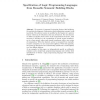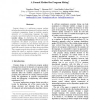30 search results - page 2 / 6 » Monad Transformers and Modular Interpreters |
AOSD
2012
ACM
12 years 19 days ago
2012
ACM
Aspect-Oriented Programming (AOP) started fifteen years ago with the remark that modularization of so-called crosscutting functionalities is a fundamental problem for the enginee...
ICFP
2002
ACM
14 years 4 months ago
2002
ACM
Monads are a useful abstraction of computation, as they model diverse computational effects such as stateful computations, exceptions and I/O in a uniform manner. Their potential ...
ICFP
2006
ACM
14 years 4 months ago
2006
ACM
Monads are widely used in Haskell for modeling computational effects, but defining monads remains a daunting challenge. Since every part of a monad's definition depends on it...
ENTCS
2002
13 years 4 months ago
2002
We present a Language Prototyping System that facilitates the modular development of interpreters from independent semantic buildks. The abstract syntax is modelled as the fixpoint...
ASWEC
2005
IEEE
13 years 10 months ago
2005
IEEE
Program slicing is a well-known program analysis technique that extracts the elements of a program related to a particular computation. Based on modular monadic semantics of a pro...


